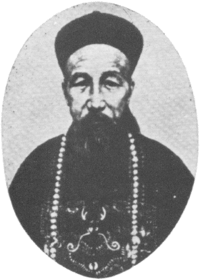Zeng Guofan
|
Zeng Guofan First Class Marquis Yiyong |
|
|---|---|

Zeng Guofan
|
|
| Viceroy of Zhili | |
|
In office 1868–1870 |
|
| Preceded by | Guanwen |
| Succeeded by | Li Hongzhang |
| Viceroy of Liangjiang | |
|
In office 1860–1864 |
|
| Preceded by | He Guiqing |
| Succeeded by | Ma Xinyi |
|
In office 1870–1872 |
|
| Preceded by | Ma Xinyi |
| Succeeded by | He Jing |
| Personal details | |
| Born |
26 November 1811 Xiangxiang, Hunan Province, Qing Empire |
| Died | 12 March 1872 (aged 60) Beijing, Qing Empire |
| Occupation | Statesman, general |
| Military service | |
| Allegiance | Qing Empire |
| Service/branch | Xiang Army |
| Years of service | 1853–1872 |
| Battles/wars |
Taiping Rebellion Tianjin Massacre |
| Zeng Guofan | |||||||||||||||||||||||
| Traditional Chinese | 曾國藩 | ||||||||||||||||||||||
|---|---|---|---|---|---|---|---|---|---|---|---|---|---|---|---|---|---|---|---|---|---|---|---|
| Simplified Chinese | 曾国藩 | ||||||||||||||||||||||
|
|||||||||||||||||||||||
| Zeng Zicheng (birth name) |
|||||||||||||||||||||||
| Chinese | 曾子城 | ||||||||||||||||||||||
|
|||||||||||||||||||||||
| Transcriptions | |
|---|---|
| Standard Mandarin | |
| Hanyu Pinyin | Zēng Guófān |
| Gwoyeu Romatzyh | Tzeng Gwofan |
| Wade–Giles | Tseng1 Kuo2-fan1 |
| IPA | [tsə́ŋ ku̯ǒ.fán] |
| Yue: Cantonese | |
| Yale Romanization | Jāng Gwok-fàahn |
| Jyutping | Zang1 Gwok3-faan4 |
| Southern Min | |
| Tâi-lô | Tsan Kok-phuan |
| Transcriptions | |
|---|---|
| Standard Mandarin | |
| Hanyu Pinyin | Zēng Zǐchéng |
Zeng Guofan (Chinese: 曾國藩 pinyin: Zēng Guófān; 26 November 1811 – 12 March 1872), birth name Zeng Zicheng, courtesy name Bohan, was a Chinese statesman, military general, and Confucian scholar of the late Qing dynasty. He is best known for raising and organizing the Xiang Army to aid the Qing military in suppressing the Taiping Rebellion and restoring the stability of the Qing Empire. Along with other prominent figures such as Zuo Zongtang and Li Hongzhang, Zeng set the scene for the Tongzhi Restoration, an attempt to arrest the decline of the Qing dynasty. Zeng was known for his strategic perception, administrative skill and noble personality on Confucianist practice, but also for the ruthlessness of his repression of the rebellion. He also exemplified loyalty in an era of chaos, but is also regarded as a precursor to the rise of warlordism.
Born Zeng Zicheng in Xiangxiang, Hunan Province in 1811, Zeng was the grandson of Zeng Yuping, a farmer with social and political ambitions. He was also a descendant of the philosopher Zengzi, a student of Confucius. He studied in Yuelu Academy in Changsha Prefecture, where he passed the prefectural examination in 1833, only a year after his father, Zeng Linshu. He passed the provincial examination a year later, and by 1838, at age 27, he had successfully passed the imperial examination, a prestigious achievement in China. He had earned the jinshi degree, the highest level in the civil service examinations, which led to his appointment to the Hanlin Academy, a body of outstanding Chinese literary scholars who performed literary tasks for the imperial court. It was at the Hanlin Academy where Zeng changed his given name to "Guofan", which sounded more prestigious. Zeng served in Beijing for more than 13 years, and remained devoted to the interpretation of the Confucian classics. He moved relatively quickly up the ranks with the aid of his teacher, Mujangga; within five years, he had become a second-grade official.
...
Wikipedia
